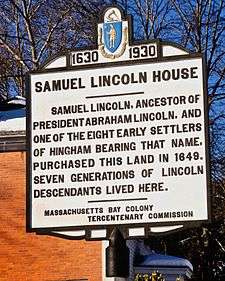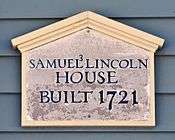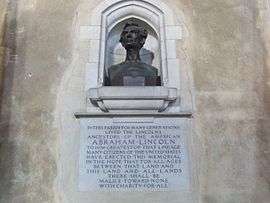Samuel Lincoln
| Samuel Lincoln | |
|---|---|
| Born |
Baptized August 24, 1622[1] Hingham, Norfolk, England |
| Died |
May 26, 1690 (aged 67) Hingham, English America |
| Children | Samuel, Daniel, Mordecai, Mary, Thomas, Martha, Sarah, Rebecca |

Samuel Lincoln (died May 26, 1690), was an Englishman and progenitor of many notable United States political figures, including his 4th great-grandson, President Abraham Lincoln, Maine governor Enoch Lincoln, and Levi Lincoln Sr. and Levi Lincoln Jr., both of whom served as Massachusetts Representatives, Governor and Lieutenant Governor.[2] Because of Samuel Lincoln's descendants, his fortuitous arrival in the Massachusetts Bay Colony, and the fact that his ancestry is known for several generations, he is considered father of the most prominent branch of Lincolns in the United States.[3]
Journey to America

Having grown up in meager circumstances due to a family squabble in which his wealthy grandfather disinherited his earlier children, Samuel Lincoln became an apprentice weaver under Francis Lawes of Norwich, England. Samuel Lincoln's father Edward had abandoned his home at Swanton Morley near Hingham after he was cut out of his father Richard's will, and relocated to some small acreage at Hingham.[4][5] In 1637, Lincoln left England for the New World with Lawes' family, embarking on a ship named John & Dorothy. Although most accounts indicate that he was 15 years old at the time, it has been suggested that he misrepresented his age in order to be permitted to make the voyage.[6]
Samuel sailed for the colony of Massachusetts, where his older brother Thomas – known in early records as "Thomas Lincoln the Weaver" to distinguish him from several other unrelated Thomas Lincolns – had already settled. Samuel's brother Thomas, who settled in 1635 in Hingham, Massachusetts, was granted a house lot by the town. Although twice married, Thomas had no children.[7] After his death, he left a great deal of his property, including several house lots, to Samuel and his nephews.[8]
Life and family in Massachusetts

Samuel Lincoln helped build the Old Ship Church in Hingham.[9] He married Martha Lyford of Ireland around 1649, possibly the daughter of the Rev. John Lyford, and the couple had eleven children, three of whom died in their infancy, but another three of whom lived into their eighties. Lincoln's eldest son, born August 25, 1650, was also named Samuel. The emigrant Samuel Lincoln's fourth son was Mordecai Lincoln, who became a blacksmith, and who was the ancestor of Abraham Lincoln.[10] Genealogists have noted the common and repeated use of certain Biblical names in the Lincoln family, particularly Abraham, Samuel, Isaac, Jacob, and Mordecai, a common practice among early Puritan settlers in the Massachusetts Bay Colony.[11] Many later Lincoln descendants, including the original emigrant's son, were named Samuel in succeeding generations.
Interestingly, Samuel's mother also belonged to a family long associated with American government: the Gilmans of Exeter, New Hampshire. Samuel's mother Bridget Gilman was the daughter of Edward Gilman of Hingham, Norfolk, England, whose son Edward Gilman Jr. emigrated to Hingham, Massachusetts, later to Ipswich, Massachusetts and finally to Exeter, where he and his family became prominent businessmen, elected officials and, later, ardent Revolutionary War patriots. Nicholas Gilman, a signer of the U.S. Constitution, was a member of this family.
Commemoration
In 1937, the 300th anniversary of Samuel Lincoln's arrival in Massachusetts was commemorated with the dedication of a tablet at the Old Ship Church in Hingham, Massachusetts. President Abraham Lincoln is honored by a bust in the church of St Andrew's in Hingham, Norfolk, England, unveiled in a 1919 ceremony by then-American Ambassador John W. Davis.[12] Samuel Lincoln's father Edward, who remained in Hingham, England, died on February 11, 1640, and was buried in the graveyard of St Andrew's Church.[13]
.jpg)
See also
Sources
- Waldo Lincoln, History of the Lincoln Family: An Account of the Descendants of Samuel Lincoln of Hingham, Massachusetts, 1637–1920 (1923) ISBN 0-7884-1489-5.
- Lincoln's Youth: Indiana Years, Seven to Twenty-One, 1816–1830, Indiana University Press (2002) ISBN 0-87195-063-4.
- Genealogy of Samuel Lincoln.
- LINCOLN (Samuel), from George Lincoln, The History of the Town of Hingham, Massachusetts, The Genealogies (1893).
- English church reaches out to Lincoln land; Building where president's ancestors once worshipped in need of major repairs.
- The Ancestry of Abraham Lincoln, James Henry Lea, John Robert Hutchinson, Houghton Mifflin Company, Boston, 1909
References
- ↑ The Ancestry of Abraham Lincoln, James Henry Lea, Robert Hutchinson, Houghton Mifflin Company, Boston, 1909, p. 4.
- ↑ Bulletin of the Essex Institute, Vol. I, 1869, Essex Institute Press, Salem, Mass., 1870
- ↑ Waldo Lincoln, History of the Lincoln Family: An Account of the Descendants of Samuel Lincoln of Hingham, Massachusetts, 1637–1920 (1923) ISBN 0-7884-1489-5; John George Nicolay, John Hay, Abraham Lincoln: A History (1890) p. 2.
- ↑ The Ancestry of Abraham Lincoln, James Henry Lea, Robert Hutchinson, Houghton Mifflin Company, Boston, 1909
- ↑ Abraham Lincoln's antecedents in the county of Norfolk, Norfolkcoast.co.uk
- ↑ William Eleazar Barton, The Life of Abraham Lincoln (1935) p. 25.
- ↑ The New England Historical and Genealogical Register, Vol. XIX, New England Historic Genealogical Society, Published by the Society, David Clapp & Son, Printers, Boston, Mass., 1865
- ↑ History of the Town of Hingham, Massachusetts, Vol. III, Thomas Tracy Bouvé, Published by the Town, John Wilson and Son, Cambridge, Mass., 1893
- ↑ History of the Town of Hingham, Massachusetts, Thomas Tracy Bouvé, et al., Published by the Town, 1893
- ↑ Transactions of the Illinois State Historical Society for the Year 1917, Illinois State Journal Co., Printers, Springfield, Ill., 1917
- ↑ Waldo Lincoln, History of the Lincoln Family: An Account of the Descendants of Samuel Lincoln of Hingham, Massachusetts, 1637–1920 (1923) p. 64.
- ↑ Hingham and the Lincoln Connection, hingham.org.uk
- ↑ St Andrew, Hingham, norfolkchurches.co.uk